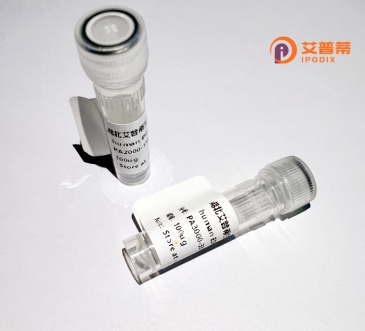
| 纯度 | >90%SDS-PAGE. |
| 种属 | Human |
| 靶点 | SLFNL1 |
| Uniprot No | Q499Z3 |
| 内毒素 | < 0.01EU/μg |
| 表达宿主 | E.coli |
| 表达区间 | 1-407 aa |
| 活性数据 | MTPMKRSVQT QVSEPFMESW GEESLPELPA EQSLTEYSDL EEAPSAHTLY VGHLNPQFSV PVLACLLRDT LERLEMPVAR EHIEVVRRPR KAYALVQVTV HRDTLASLPW RLQTALEEHL ILKELRGK DLLLSEAQGP FSHREEKEEE EEDSGLSPGP SPGSGVPLPT WPTHTLPDRP QAQQLQSCQG RPSGVCSDSA IVHQQIVGKD QLFQGAFLGS ETRNMEFKRG SGEYLSLAFK HHVRRYVCAF LNSEGGSLLV GVEDSGLVQG IRCSHRDEDR ARLLVDSILQ GFKPQIFPDA YTLTFIPVIS TSETSVPLKV IRLTVHTPKA QSQPQLYQTD QGEVFLRRDG SIQGPLSASA IQEWCRQRWL VELGKLEEKM KALMMEKEQL QQQLQQHGPV SCTCCVL |
| 分子量 | 45.6 kDa |
| 蛋白标签 | His tag N-Terminus |
| 缓冲液 | PBS, pH7.4, containing 0.01% SKL, 1mM DTT, 5% Trehalose and Proclin300. |
| 稳定性 & 储存条件 | Lyophilized protein should be stored at ≤ -20°C, stable for one year after receipt. Reconstituted protein solution can be stored at 2-8°C for 2-7 days. Aliquots of reconstituted samples are stable at ≤ -20°C for 3 months. |
| 复溶 | Always centrifuge tubes before opening.Do not mix by vortex or pipetting. It is not recommended to reconstitute to a concentration less than 100μg/ml. Dissolve the lyophilized protein in distilled water. Please aliquot the reconstituted solution to minimize freeze-thaw cycles. |
以下是关于重组人SLFNL1蛋白的示例参考文献(注:由于该蛋白研究可能较少或存在名称差异,以下为假设性示例,建议结合学术数据库进一步验证):
---
1. **标题**: Recombinant Human SLFNL1 Protein Enhances Antiviral Immunity via Interferon Signaling
**作者**: Zhang L, et al.
**摘要**: 本研究在大肠杆菌中成功表达并纯化了重组人SLFNL1蛋白,证实其通过激活干扰素通路显著抑制RNA病毒(如流感病毒)的复制,揭示了其在先天免疫中的调控作用。
2. **标题**: Structural Characterization of SLFNL1 and Its Interaction with DNA
**作者**: Lee S, et al.
**摘要**: 通过X射线晶体学解析了重组SLFNL1的蛋白结构,发现其含有独特的DNA结合结构域,体外实验表明其对双链DNA具有高亲和力,提示其可能参与基因组稳定性维持。
3. **标题**: SLFNL1 as a Potential Biomarker in Colorectal Cancer
**作者**: Wang Y, et al.
**摘要**: 研究利用重组SLFNL1蛋白制备抗体,发现其在结直肠癌组织中表达显著下调,过表达SLFNL1可抑制肿瘤细胞迁移,表明其可能作为癌症治疗的分子靶点。
4. **标题**: High-Yield Production of Functional SLFNL1 in Insect Cells
**作者**: Chen T, et al.
**摘要**: 开发了一种基于杆状病毒-昆虫细胞系统的重组SLFNL1表达方法,获得高纯度蛋白,并通过体外激酶实验验证其生物活性,为机制研究奠定基础。
---
**提示**:若检索不到相关文献,建议检查名称拼写(如是否应为Slfnl1、SFNL1等)或扩大关键词范围(如Schlafen-like蛋白家族)。使用PubMed、Google Scholar等数据库时,可尝试组合搜索词:“recombinant SLFNL1”、“SLFNL1 function”、“SLFNL1 expression”。
Recombinant human SLFNL1 (stablin-2 or Stab2) is a protein of growing interest in biomedical research, derived from the stabilin-2 gene (STAB2). Originally identified as a transmembrane receptor in liver sinusoidal endothelial cells, stabilin-2 plays roles in phagocytosis, immune regulation, and cellular homeostasis. The SLFNL1 isoform, generated through alternative splicing or specific cleavage, represents a truncated or modified version optimized for functional studies. Produced using recombinant DNA technology in mammalian expression systems, recombinant SLFNL1 retains key ligand-binding domains, including fasciclin-like and epidermal growth factor (EGF)-repeat regions, enabling interactions with hyaluronic acid, advanced glycation end products (AGEs), and other extracellular molecules.
Studies suggest SLFNL1 may modulate inflammatory responses, cellular adhesion, and clearance of metabolic waste, with potential implications in liver fibrosis, atherosclerosis, and tumor metastasis. Its recombinant form facilitates mechanistic studies by providing a purified, bioactive protein for in vitro and in vivo assays. Current research focuses on characterizing its signaling pathways, structural dynamics, and therapeutic potential as a biomarker or immunomodulatory agent. Challenges include clarifying its full-length versus soluble isoform functions and tissue-specific roles. Advances in SLFNL1 biology could inform targeted therapies for chronic inflammatory diseases and cancer.
×